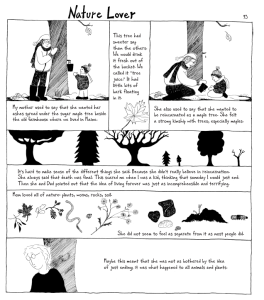

Yet it was not possible for her to give her consent to this picture of herself. Midge Leavitt had no control of her bodily functions, undressed at the most inopportune times, said outlandish and hurtful things and acted like a crazy woman. But it also raises the ethical questions that must be asked of any graphic depiction of an Alzheimer’s patient. Such honesty makes this memoir engrossing and believable. And then when they hang up, Leavitt draws herself prone on the floor, kicking her arms and legs like a child, and screaming, “I want my Mommy!”

I decided to pretend she wasn’t my mother so I could manage to stay on the phone and listen to her.” She does, soothing her mother for an hour or so, acting the grown-up. Leavitt writes: “Then she started crying really hard. She recalls one of her weekly phone conversations with her parents, when her mother asked her father to leave the room and then railed against him and the world: “I’m a NOBODY! I’m not a REAL PERSON anymore!” Or maybe that was just a daughter’s way of coping.īut as the disease progresses, Leavitt gives full voice to her own amalgam of confusion, embarrassment, fury and despair. The book is interspersed with photographically reproduced snatches of her mother’s deteriorating handwriting and other material that Sarah collected along the way, to document the descent as if to prove it actually happened. Sarah is the prodigal daughter, who moves far away to establish her own identity, and then becomes so pulled into the family drama that she becomes its chronicler. We get the family dynamics: unorthodox, old-style hippie parents who raised two girls - Sarah and her younger sister, Hannah - in a nonreligious household that still felt very Jewish. At first, I wasn’t sure whether Leavitt could do justice to the confusing feelings and family dynamics that she aims to portray in “Tangles,” which she calls “a story about Alzheimer’s, my mother and me.” While the genre of graphic novels has grown ever more sophisticated, it’s still a challenge to turn comic book heroes into complicated human beings.īut Leavitt is able to make her characters seem real with a few strokes of the pencil and fewer words. I felt that way about the whole memoir it works. Suddenly, it’s very dark and frightening outside. The declaration is presented in a black-shaded panel: The obituary feel of it emphasizes the sorrow and aloneness of the statement. Just as she gathers the courage to face her parents, Midge and Rob, and to express concern over her mother’s growing forgetfulness and erratic behavior, Midge blurts out, “I have Alzheimer’s.” But Leavitt’s simplicity works in her favor. So The Conversation is not an easy moment to portray, especially in a memoir like this, which mixes handwritten words with line drawings that in another context might appear childish or whimsical.


 0 kommentar(er)
0 kommentar(er)
